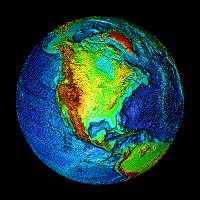Alaska’s Pavlof Volcano ejects a plume 28,000 feet asl
Pavlof is erupting vigorously, exhibiting strongest seismic activity detected so far this year, characterized by intense, continuous tremor and intermittent explosions suggesting lava fountaining and ash production, Alaska Volcanoes Observatory (AVO) reported.
The wave of intense activity started late on Monday and continued into Tuesday, with trace ash fall reported in the community of King Cove about 30 miles southwest of the volcano.
AVO Daily Update – Tuesday, June 25, 2013 @ 12:33 PM AKDT (Tuesday, June 25, 2013 @ 20:33 UTC)
PAVLOF VOLCANO (CAVW #1102-03-)
55°25’2″ N 161°53’37” W, Summit Elevation 8261 ft (2,518 m)
Current Volcano Alert Level: WATCH
Current Aviation Color Code: ORANGE
In its daily briefing AVO said:
Vigorous eruptive activity indicated by a distinct increase in seismicity beginning around 6:50 UTC (22:50 AKDT) last evening is continuing. The level of seismicity for the past 11-12 hours has been the strongest seismic activity detected so far during the 2013 eruption of Pavlof Volcano. The seismicity is characterized by intense, continuous tremor and intermittent small explosions that are likely associated with lava fountaining and ash production.
- A distinct plume extending to the west of the volcano rising as high 28,000 feet above sea level (a.s.l.) according to Satellite data and pilot reports.
- Satellite imagery also show strong thermal signals at the volcano summit.
- AVO received a report of trace ash fall on the community of King Cove about 30 miles southwest of the volcano on June 25, 2013.

Pavlof volcano, as viewed from Cold Bay on June 7, 2013. Photo credit: Robert Sigurdson, via AVO.
At this level of unrest it is likely that lava fountaining and ash emission are occurring. Lava fountaining is likely producing spatter-fed lava flows that are descending the flanks of the volcano over ice and snow and could be producing substantial steam plumes. These plumes probably contain variable amounts of ash. At the level of unrest observed over the past 11-12 hours, the volcanic plume has not been particularly ash rich; however, this could change if the character of the eruption changes and it remains possible for more robust ash plumes to be generated at any time. AVO is monitoring the eruption closely and will issue further information as it becomes available.
Mount Pavlof, one of the most active volcanoes in the U.S., has been erupting since May 13, spewing ash and lava at a low intensity.

Index map showing the location of Pavlof and other Quaternary volcanoes on the Alaskan peninsula. Volcano(es): Alagogshak, Amak, Aniakchak, Basalt of Gertrude Creek, Black Peak, Chiginagak, Cone 3110, Cone 3601, Dana, Denison, Devils Desk, Douglas, Dutton, Fourpeaked, Frosty, Griggs, Iron Trig cone, Kaguyak, Katmai, Kejulik, Kialagvik, Knob 1000, Kukak, Kupreanof, Mageik, Martin, Novarupta, Pavlof, Pavlof Sister, Rainbow River cone, Steller, Stepovak Bay 1, Stepovak Bay 2, Stepovak Bay 3, Stepovak Bay 4, Trident, Ugashik-Peulik, Unnamed (near Ukinrek Maars), Veniaminof, Yantarni. Credit Janet Schaefer/AVO
Veniaminof Volcano Activity [Source: AVO]
Continued volcanic tremors suggest that the Veniaminof Volcano is still erupting, said AVO. Recent satellite images show elevated surface temperatures at the intracaldera cone; webcam images from Perryville show a light-colored plume rising above the rim of the intracaldera cone, some 8,200 feet a.s.l.
It is possible for activity at Veniaminof Volcano to increase above its current level at any time and more vigorous ash emissions may result. Sustained periods of volcanic tremor may correspond with continuous ash emission which may not be detected in satellite data, especially if ash plumes remain below 15,000 to 20,000 feet above sea level. Brief bursts of ash emission and small explosions with ash fall limited to areas on the flanks of the volcano are likely to occur while the volcano is at its current level of unrest. A larger explosive episode and associated ash emission is not expected at the current level of unrest; however, this remains possible and would be evident in seismic and satellite data.
Current Volcanic Activity [as of June 26, 2013]
Alaska
Cleveland YELLOW ADVISORY
Pavlof ORANGE WATCH
Veniaminof ORANGE WATCH
Kamchatka Peninsula
Gorely YELLOW
Karymsky ORANGE
Kizimen ORANGE
Tolbachik ORANGE
Bezymianny YELLOW
Sheveluch ORANGE
Kurile Islands
Chirinkotan YELLOW











